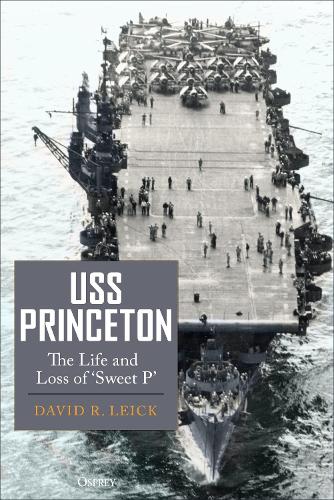
USS Princeton: The Life and Loss of 'Sweet P'
(Hardback)
Publishing Details
USS Princeton: The Life and Loss of 'Sweet P'
By (Author) David R. Leick
Bloomsbury Publishing PLC
Osprey Publishing
4th February 2025
United Kingdom
Classifications
General
Non Fiction
Naval forces and warfare
Battles / military campaigns
940.5426
Physical Properties
Hardback
304
Width 160mm, Height 240mm, Spine 32mm
600g
Description
An in-depth history of the US Navys light aircraft carrier the USS Princeton and its operational exploits in the Pacific Theater of World War II. The USS Princeton (CVL-23) joined the Pacific fleet in August 1943 and was immediately put to work as the United States was assembling new ships and crews for the drive across the Central Pacific. Princeton participated in initial Central Pacific raids, played a key role in conducting multiple strikes against the Japanese bastion at Rabaul, and then joined Task Force 58, The Fast Carrier Task Force, for the drive across the Central Pacific culminating in the invasion of the of the Philippines, where the ship was lost. The Princeton started life as the as the Cleveland-class light cruiser Tallahassee before being converted to a light carrier as part of the plan to ramp up the strength of US naval air power. The Princeton was at the forefront of the US Navys efforts to take the heavily defended islands of the Central Pacific from Japanese possession, which focused on using strike aircraft from Princeton and the other carriers to both clear the skies of Japanese aircraft before wreaking havoc on enemy installations, shipping, and other key targets. In Life and Death of Sweet P, first-time author David R. Leick uses first-hand accounts from archives such as the Naval History and Heritage Command to examine the campaigns, aircraft, tactics, command decisions, and life aboard ship during the American Pacific campaign against Japan from early 1943 until Princetons tragic demise in October 1944. The book focusses closely on the crew and airmen of the Princeton, telling the story how Fighting 27 became the highest scoring light carrier squadron of the war, producing 11 aces with five achieving ace-in-a-day status, as well as describing in detail the toll that prolonged combat operations took on the frontline sailor.
Author Bio
David Leick enlisted in the United States Marine Corps following High School, serving as a Marine Rifleman, Reconnaissance Marine, and Marine Scout/Sniper. Following his honorable discharge he attended California State University, Chico, where he earned a masters degree and went into teaching. In 2005 he stepped away from the classroom to work as a security contractor in Afghanistan on the Ambassadors Protective Detail before working more generally for the Worldwide Protective Service as the training manager at the United States Department of State Diplomatic Security Service Headquarters. David now writes full time and lives in Lincoln, California.
